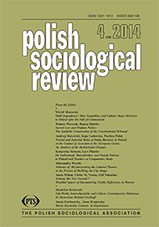'Path Dependence': How Geopolitics and Culture Shape Divisions in Poland after the Fall of Communism
'Path Dependence': How Geopolitics and Culture Shape Divisions in Poland after the Fall of Communism
Author(s): Witold MorawskiSubject(s): Social Sciences
Published by: Polskie Towarzystwo Socjologiczne
Keywords: historical institutionalism; structure and agency; two chains of cause and effect:geopolitical and cultural; configuration approach
Summary/Abstract: I examine two long-wave processes, geopolitics and culture, which I consider to be the main causes for the fall of communism and the beginning of the transformation. As a result of the geopolitical situation-in the shape of communism's multidimensional defeat by capitalism-the national culture was able to help society use the new geopolitical context successfully. I distinguish two sequences of cause and effect: The geopolitical one, in which the sequence begins with geopolitics treated as an independent variable and an element shaping all systems, which are treated as dependent variables, i.e., communism loses to capitalism -> downfall of the state, for instance, the 'Round Table' -> downfall of the central, planned economy (economic reform) -> 'S' as organized rebellion -> the Western model; and the cultural sequence, which begins from culture treated as an independent variable and a factor shaping all systems, which are treated as dependent variables, i.e., community based on national, religious, traditional, and solidarity values -> 'us' against 'them' -> industrial workers and the Church hierarchy supporting gradual change -> the ruined work environment and civil society -> Christian Europe and Poland's mission in East Central Europe. I do not absolutize either geopolitical or cultural explanations (these are tools). I am closest to a configuration approach, in which attention is concentrated on all the factors that could contribute with 'equal strength' to forming a 'virtuous circle'. It is a relational approach, neither determinist nor constructivist (voluntarist). Structures and agencies possess autonomous powers of causal influence. There is a dual constituting of the agency/actor and the structure/system.
Journal: Polish Sociological Review
- Issue Year: 188/2014
- Issue No: 4
- Page Range: 435-460
- Page Count: 25
- Language: English

